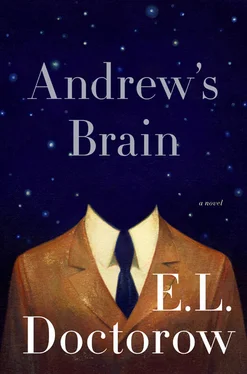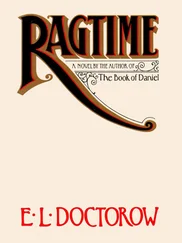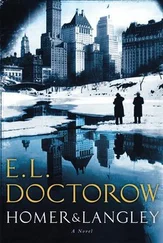Yes? You were saying?
No, I was just thinking. Suppose there was a computer network more powerful than anything we could imagine.
What’s this?
I remember trying this idea out on her. And never mind a network, just this one awesome computer, say. And because it was what it was, suppose it had the capacity to record and store the acts and thoughts and feelings of every living person on earth once around per millisecond of time. I mean, as if all of existence was data for this computer — as if it was a storehouse of all the deeds ever done, the thoughts ever thought, the feelings ever felt. And since the human brain contains memories, this computer would record these as well, and so be going back in time through the past even as it went forward with the present.
That is a tall order, even for a computer.
Not for this baby. Consider the possibility that there are things you don’t know, Doc.
I consider that every day.
I’ll tell you one thing you may not know: The genome of every human cell has memory. You know what that means? As evolved beings we have in our genes memories of the far past, of long-ago generations, memories of experiences not our own. This is not pie-in-the-sky stuff, a neuroscientist will tell you the same thing. And all we need is the right code to extract what the cell knows, what it remembers.
Sounds poetic.
I’m talking science here, I’m telling you my computer to end all computers that sucks up the mental and physical activities of every living thing — I mean, let’s throw in the animals too — necessarily then can go back in time and move into the past as readily as it moves along with the present. Do you give me that?
OK, Andrew.
So what that means, what that means …
Yes?
… that at least on the microgenetic level couldn’t there be the possibility of recomposing a whole person from these bits and pieces and genomic memories of lives past?
You don’t mean cloning.
No, dammit, I don’t mean cloning. We’re talking about how this computer could crack the code of every cell of every human brain and reconstitute the dead from their experiences. Isn’t that something like reincarnation? Maybe it wouldn’t be perfect, you couldn’t always see her, maybe if you reached out she would be just a shade of herself, but she would be a presence, and the love would be there.
Who are we speaking of now?
What possessed me to tell Briony all this? If this computer could come up with the code to read the makeup of our cells, in birth, in death, in the ashes of our cremation, in the rot of our coffins, and of course it could because of what it was, then we could recover our lost babies, our lost lovers, our lost selves, bring them back from the dead, reunite in a kind of heaven on earth. Do you see that?
Well, maybe on a speculative level …
But if you accept the premise the logic is sound, will you give me that?
I give you that.
But you still don’t know what this computer is, do you? Oh, Doc, if there was such a computer, it could do anything, finally. I mean, call it by its rightful name. And I could have my baby with Martha brought back. And I could have my Briony, and we would bring our baby home and we would be a family.
YOU ASKED ME to keep a diary or daybook. Writing is like talking to yourself, which I have been doing with you all along anyway, Doc. So what’s the difference. I’m writing from Down East: This morning it’s like the winter fog has frozen. To walk the fields is to feel yourself breasting the air, leaving behind you the sound of tinkling ice and a tubular indication of your form. But I need places like this. I am safe here. I mean, for all we know I put you in danger every time I walk into your office.
And now, later, the wind has come up and blows snow against my window and I must turn on the light. I have nothing to read here but the cabin owner’s complete works of Mark Twain, MT embossed on the cracked binding. How MT dealt with life was to make a point of explaining children to adults, and adults to children. Isn’t that so? Or to write of his neighbors with amused compassion. He went to ridiculous church for the sake of his wife. Invested in an unworkable Linotype machine. Hobnobbed with the Brahmins of Boston. Slyly skewered the self-satisfied gentlemen enjoying his after-dinner speeches. Noted the anointed barbarity of kings. But always, always, it was to wrap himself in society. To keep himself snugly within what Searle, a guy whose work I teach, calls “the construction of social reality.”
And just now, loud as a clap of thunder, a poor dumb gull riding the winds has bashed his head against the windowpane. I exchange looks with his glazed eye as he slides a smeared red funnel down the snow on my window.
Another day: I see through the fog the humped green heron, out there on the piling. All huddled into himself, a gloom bird, one of us.
Now, later, the sky turned cold and clear, the wind cuffing the seawater, and I imagine a warm swamp somewhere filled with the jumping frogs of Calaveras County. I mean, you read him and he does put one over. But for me the intemperate ghost of MT rises from his folksy childhood and rages at the imperial monster he has helped create.
I see his frail grasp of life at those moments of his prose, his after-dinner guard let down and his upwardly mobile decency become vulnerable to his self-creation. And the woman he loved, gone, and a child he loved, gone, and he looks in the mirror and hates the pretense of his white hair and mustache and suit, all gathered in the rocking-chair wisdom that resides in his bleary eyes. He despairs of the likelihood that the world is his illusion, that he is but a vagrant mind in a futile drift through eternity.
See the ant, he says, how stupid and incompetent he is, dragging some fly’s wing hither and yon, hauling it over pebbles because they are in his way, climbing leaves of grass because he doesn’t know not to, and where does he think he’s going, says MT, nowhere, that’s where.
Another morning. I am down on the beach as the osprey hovers pulsingly over the sea, and the sanderlings tiptoe along the ocean’s foamy edge while the shadowing blue-fish waits for the tide to flip them into its razored maw.
This is you, God. And who did you say it was, Jonah, riding the struts of the leviathan? With the tons of fish washing beneath him into the digestive caldron, as he plants one foot on one beamy rib, the other on the other, and it would be dark except for the luminescence of the electric fishes looking to find their way out, against the tide, against the moon-rock slurp of the ocean tide, against the diurnal twist of the rumbling planet that cups the ocean, that nods the mountains back and forth in metronomic rhythm …
… this earth we find ourselves gravity-stuck to, me and MT and my flaxen-haired fairy-tale beauty, my darling who read to me, by the light of a flashlight, as I drove us at night across the continent, read to me of the imperial outrages annotated by MT in the last years of his life, when the truth of his humor turned green and bilious, when he saw by the light of the moon with the night heron humpslunk between its shoulders that the impossible world was not effectively met any longer by satire or mockery.
So, Doc, I write to tell you that I agree: Life — in being irresolute, forever unfinished though the deaths are astronomical — is not a movie. I do not see in my mind a white-robed D-cup empress facing down a phalanx of centurions looking like me in their spiked helmets and shields and spears and leather-striped calves, those extra-filled movies that drip their Technicolor effusions over the ghosts of the ancient empire so like our own.
Ah, but when they didn’t make a sound, how uncanny they were with the title cards doing the talking, the written-out words blocking our view to make things clearer. A mysterious intervening translation agency connecting us in our own language to a shadow world where humans like us were speaking to one another in their spiked helmets and shields, in their black ties and cigarette holders and ass-clinging white satin evening gowns, but from such otherwordly distances that you could not hear them, though they seemed to hear themselves.
Читать дальше











